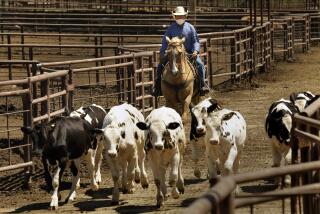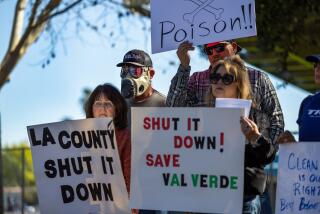New woes hit Colorado: Contaminated floodwaters, oil spill
WESTMINSTER, Colo. -- The warning from local health officials dealing with the flooding in Colorado is simple: Don’t get in the water.
Underscoring that message, state officials have reported a 5,250-gallon oil spill from a flood-damaged tank overtaken by the South Platte River in Weld County, a deluged area northeast of Denver.
The tank’s owner, Anadarko Petroleum Corp., responded by placing absorbent oil booms in the water.
But it’s not just oil in the floodwaters that is raising concerns.
A Los Angeles Times’ dispatch from the town of Evans on Wednesday reported on fears by local residents and officials that a flooded wastewater treatment plant had turned the inundated riverfront of the town into an open sewer. There were concerns about other toxins too.
“There’s a lot of stuff in that water. What we’re primarily worried about is the sewage and the [agricultural] runoff -- fertilizer stuff from people’s lawns, to manure from the dairy farms,” said Jennifer Finch, a spokeswoman for Weld County, where Evans is located.
One of the biggest questions for local environmentalists has centered on how the flooding has affected the numerous hydraulic fracturing or “fracking” wells in Weld County, though the state’s oil and gas regulator downplayed those concerns.
“The primary pollutant of concern associated with oil and gas locations is crude oil, which is stored in tanks on site,” Todd Hartman, a spokesman for the Colorado Oil and Gas Conservation Commission, said in a statement.
Hartman said the agency had heard the environmentalists’ concerns about the floods picking up chemicals from fracking operations, but noted that those chemicals “are only on site during the drilling and fracturing of the well and do not remain on site once the well is in production.”
The “vast majority” of wells hit by floodwaters were in the producing stage,” Hartman said.
He added that the operators of producing fracking wells affected by the flooding had been aggressive about securing the facilities through a process known as “shutting in,” which by remote control halts the production of oil and gas.
The extent to which those efforts were successful is still under evaluation. State inspection teams are in the process of surveying affected industrial sites, where an unknown number of storage tanks have been knocked over or otherwise displaced by the floodwaters.
ALSO:
Wet, muddy and broken: Photos from a ravaged Colorado
Mother of Navy Yard shooter Aaron Alexis: ‘I don’t know why...’
Ohio man who confessed online pleads guilty to vehicular homicide
Follow L.A. Times National on Twitter
More to Read
Start your day right
Sign up for Essential California for news, features and recommendations from the L.A. Times and beyond in your inbox six days a week.
You may occasionally receive promotional content from the Los Angeles Times.







